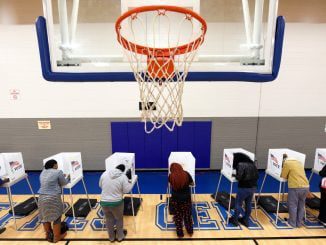TALLAHASSEE, Fla. — Voter advocates aligned with Democrats dropped a federal lawsuit that sought to make it easier to vote by mail in Florida during the coronavirus pandemic after Republican officials promised to explore ways of reducing barriers during the August primary and the presidential election in November.
The advocates wanted the state to promote absentee balloting through publicity campaign. They also asked the court to extend deadlines for returning ballots, require postage be prepaid by elections officials and allow people other than family members to collect and deliver completed ballots.
The agreement announced Sunday avoids a trial that was set to begin Monday, but it remains to be seen how aggressively Republican Gov. Ron DeSantis or his appointed secretary of state will pursue any of the measures they agreed to. Key elements of the lawsuit also remain unresolved, including the timeline for counting ballots and the groups’ attempt to expand who can collect vote-by-mail ballots.
Priorities USA and the Florida Democratic Party had filed suit amid fears that the pandemic will make some voters too afraid of infection to cast ballots in person on Election Day. Florida also had an early taste of voting chaos when some workers didn’t show up to polling places during the March 17 primary, leaving long lines of frustrated citizens.
Local elections officials are hoping to avoid a repeat in November in a state where the results could determine the nation’s balance of political power. And they’ve been watching what happened in the primaries that followed in other states such as Georgia, which had problems with lines and vote counts because of the unprecedented volume of absentee ballots.
Under the settlement announced Sunday, state elections officials will explore whether money from a federal coronavirus aid package can be used to pay for prepaid postage for returning ballots. The Florida Secretary of State’s office, which has oversight over elections, also promised to encourage local officials to establish more early voting sites.
The office also agreed to launch a campaign to educate voters about voting by mail, including where they can drop of ballots. Elections officials have said they will be pushing more Floridians to vote by mail, even as they acknowledged that the state is not prepared to conduct upcoming elections entirely through the postal service.
“The settlement establishes a set of commitments by Florida election officials to expand voting rights and opportunities across the state,” said Guy Cecil, Chairman of Priorities USA.
Key elements of the suit, however, were left unresolved. The groups had asked that ballots be counted even if they arrive after Election Day, and that groups without any previous relationship with a voter be allowed to return ballots.
Last month, U.S. District Judge Robert Hinkle expressed skepticism that the voter advocates would prevail, and declined to issue a temporary injunction.
DeSantis had already suggested that schools be closed so they can be used as polling places, that state workers could staff precincts and that local elections officials could be given more time to count ballots. Republican groups said the settlement shows how weak the case the was.
The “Democrats’ assault on our elections process is not based on fact or reason, which is why they are dismissing every claim in their radical suit,” said the chair of the Republican National Committee, Ronna McDaniel.



